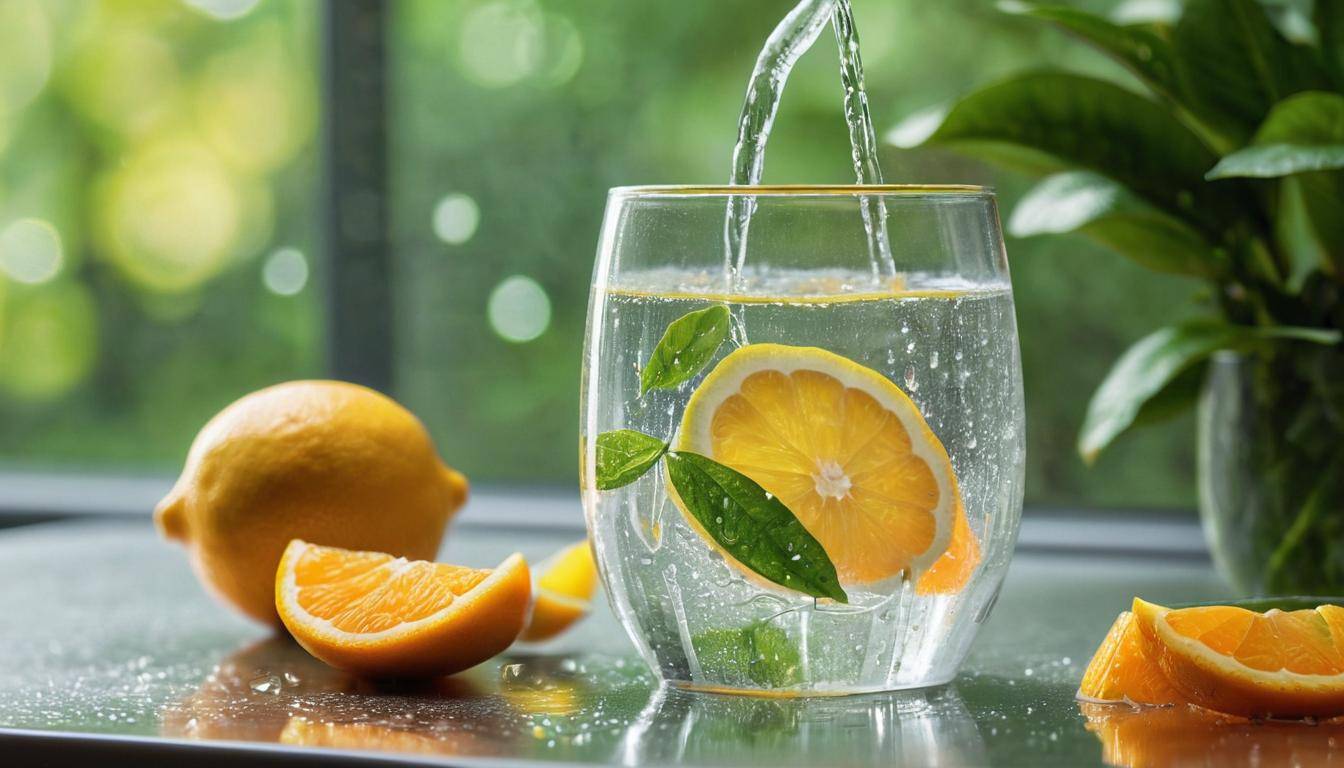Water is essential to our lives, making up over half of our bodies. It’s not just about quenching thirst; it plays a vital role in keeping our brains sharp, our skins glowing, and our energy levels high. Research shows that being hydrated can improve brain function by 30%, help prevent kidney stones, and assist with weight management. Imagine that a simple habit like drinking enough water could be such a game-changer.
When you’re not properly hydrated, you might feel tired, have trouble focusing at work, and experience those familiar headaches. These symptoms make everyday tasks seem harder than they should be. By diving deep into scientific studies and expert opinions, we’ll explore how staying hydrated affects your overall health. You might find that boosting your water intake is one of the simplest yet most effective changes you can make for better days ahead.
Hydration is essential for maintaining overall health, as it supports physical performance, brain function, headache relief, and digestive health. Proper water intake can help prevent dehydration-related issues, improve mood and cognitive abilities, enhance energy levels, and even aid in weight management by promoting satiety and reducing overeating.

Importance of Hydration in Overall Health
Water plays a critical role in sustaining life and maintaining the body’s essential functions. As the building block of cells, it assists every aspect of bodily performance, from regulating temperature to facilitating digestion and nutrient absorption. Imagine trying to run a high-performance machine with a low fuel supply; that’s what happens to our bodies when we don’t stay well-hydrated. Adequate hydration supports metabolic processes and enhances muscle performance and endurance during physical activities.
A compelling piece of research from the Journal of Biological Chemistry highlights just how transformative optimal hydration can be: it has been shown to improve cognitive function by a striking 30%. This significance becomes particularly clear when considering tasks requiring concentration, focus, or memory retention. In simpler terms, if you’re heading into a meeting, taking an exam or even trying to study, drinking enough water can make you sharper and more alert.
Moreover, staying hydrated effectively reduces the risk of kidney stones by up to 50%. This is especially crucial for those susceptible to urinary tract conditions. Kidney stones often develop when urine becomes concentrated with minerals due to inadequate fluid intake. Hence, drinking water dilutes these minerals, lessening that risk significantly.
With such clear benefits underlining the importance of hydration, even mild dehydration can disrupt our everyday lives. The brain comprises approximately 75% water, so when hydration levels drop even slightly, it can lead to negative shifts in mood and energy. Studies indicate that losing around 1-3% of body weight through dehydration can correlate with fatigue and a decline in overall physical performance.
Imagine going about your day feeling unusually tired or irritable—often, dehydration could be at play without us realizing it.
Facing the everyday hustle and bustle, remember that drinking water is not merely quenching your thirst; it is investing in your well-being and enhancing your overall quality of life as we explore specific guidelines to ensure optimal hydration.
Daily Water Intake Guidelines
Knowing how much water you should drink can feel overwhelming, but it really boils down to a few simple steps. The common guideline, often dubbed the 8×8 rule, suggests drinking eight 8-ounce glasses of water each day, totaling about 2 liters. While this is an easy benchmark, it’s important to recognize that our individual hydration requirements vary significantly based on several factors.
The truth is, hydration is not a one-size-fits-all practice; personal factors play a huge role.
Calculating Personalized Water Needs
To get a better sense of how much water you need daily, consider taking your body weight into account. A general formula for personalized hydration is quite intuitive: divide your weight in pounds by 2 and aim to drink that number in ounces of water per day.
For instance, if you weigh 150 pounds, you’d aim for around 75 ounces of water daily. This systematic approach helps ensure that you’re drinking enough to support your body’s functions while also recognizing the variability among individuals.
| Weight (lb) | Daily Water Intake (oz) |
|---|---|
| 120 | 60 |
| 150 | 75 |
| 180 | 90 |
| 210 | 105 |
| 240 | 120 |
The table above illustrates how different weights correlate with daily water intake recommendations, allowing you to find a target that suits your personal needs. Keep in mind that this calculation offers a solid starting point; however, other elements such as age, gender, activity level, and environmental conditions—like temperature—can further influence your hydration goals.
Listening to your body’s signals and adjusting your intake accordingly is essential. For example, during intense exercise or on sweltering days, you may need substantially more than your calculated baseline. Each sip is more than just quenching thirst; it’s empowering your body for optimal performance and health.
Recognizing Dehydration Symptoms
Early signs of dehydration can sneak up on you, often manifesting in subtle yet important ways that signal your body needs more water. Left unchecked, these symptoms can escalate swiftly from mild discomfort to serious health risks, so it’s essential to stay vigilant.
Common Symptoms
When it comes to identifying dehydration, several common symptoms deserve your attention. These include a dry mouth, which is one of the first indications your body is yearning for hydration. This can lead to feelings of fatigue, as your energy levels dip significantly because water is fundamental in transporting nutrients and oxygen throughout your body. Additionally, headaches often accompany dehydration; studies have shown that even slight fluid deficits can trigger head pain.
As you monitor your body’s signals, pay attention to the color of your urine. Dark yellow urine isn’t just an inconvenience; it’s a clear indicator of dehydration—a well-hydrated individual should see light yellow or clear urine. You might also experience dizziness and confusion, both alarming symptoms that suggest your brain isn’t getting the hydration it needs to function well.
In fact, research published in the American Journal of Public Health highlights a significant finding: losing just 1-3% of your body weight in water can lead to noticeable cognitive impairments and mood swings.
Recognizing these symptoms early allows you to take immediate corrective action before things spiral out of control.
I recall a time when I went on a short hike without properly hydrating beforehand. Midway through the trek, I began feeling unusually tired and irritable, and it took me a moment to realize that my carelessness with water was to blame. A quick drink revitalized my spirits; simply hydrating made a world of difference, allowing me to enjoy the rest of my day outdoors without feeling hindered by fatigue.
Understanding these clear signs of dehydration empowers you to act swiftly and maintain your health. Being proactive about hydration not only enhances your physical stamina but also ensures that you’re mentally sharp and ready for whatever comes your way.
Shifting focus from recognizing symptoms, we’ll now explore how staying properly hydrated benefits overall health and vitality.
Health Benefits of Staying Hydrated

One of the most significant advantages of drinking enough water is improved physical performance. When we engage in exercise or daily activities, our bodies require a certain amount of fluid to function optimally. Losing just 2% of your body’s water content can lead to noticeable declines in performance levels. Imagine going for a jog and suddenly feeling fatigued; that could well be the result of minor dehydration. A study published in the British Journal of Sports Medicine reveals that athletes who maintain proper hydration during their workouts can enhance performance by as much as 20%. This underscores the importance of staying adequately hydrated before, during, and after physical activity.
Beyond physical prowess, hydration plays a pivotal role in enhancing brain function. A study conducted in Germany, published in Physiology & Behavior, discovered alarming implications tied to dehydration levels as low as 1-2%. Even slight dehydration can impair cognitive abilities, affecting everything from memory retention to decision-making skills. By maintaining consistent hydration, you ensure that your brain remains sharp and focused, enabling you to tackle daily challenges with an improved mood and clarity of thought. Just picture struggling to solve a simple math problem due to mild dehydration—that’s how crucial proper fluid intake can be.
Furthermore, adequate hydration has far-reaching effects on various vital bodily functions, promoting healthier skin and aiding digestion. Hydration allows nutrients to flow smoothly through your system while flushing out toxins efficiently.
Our bodies are approximately 60% water, and every cell relies on water to perform its tasks effectively. From sustaining energy levels throughout long workdays to assisting the kidneys in filtering waste products from our blood, staying hydrated forms the foundation of good health.
In examining these aspects further, it becomes clear that prioritizing water intake not only enhances physical efficiency but also preserves neurological capabilities and overall wellness.
Hydration and Vital Bodily Functions

One of the most critical functions influenced by our hydration levels is kidney function. The kidneys are remarkable organs that serve as the body’s natural filtration system. Proper hydration ensures they can perform their job effectively by filtering out waste products and balancing bodily fluids.
When you drink enough water, it significantly aids the kidneys in flushing out toxins. Without adequate hydration, these waste products can accumulate, leading to an increase in concentration of substances such as minerals and salts that sometimes form into kidney stones.
Research highlights that individuals who consume sufficient amounts of water can lower their risk of developing kidney stones by nearly 60%. Keeping hydrated is like providing your kidneys with a well-deserved spa day after a long workout; they’re more efficient, and you reap the benefits of better health.
After understanding the role hydration plays in kidney health, it’s equally important to look at its impact on digestive health.
Water is essential for a healthy digestive system. It helps dissolve fats and soluble fibers, making nutrients more accessible during digestion. Imagine trying to mix oil with vinegar; without water to bridge those ingredients, they won’t combine well.
The same principle applies inside your digestive tract: without adequate hydration, food passes through too slowly, leading to constipation. This creates discomfort and hinders optimal absorption. Studies from the National Institutes of Health (NIH) support this connection, showing that regularly hydrated individuals experience significantly lower rates of constipation-related complications compared to their less hydrated peers.
In essence, maintaining good hydration promotes smoother digestion and enhances your overall gastrointestinal function.
Both kidney function and digestive health are just pieces of the hydration puzzle; every aspect of our health relies on making sure we have an adequate intake of water to keep our bodies performing optimally. Now let’s explore effective ways to ensure you stay hydrated throughout your day.
Practical Tips for Daily Hydration
One of the simplest yet most effective ways to start your hydration journey is by beginning your morning with a glass of water. After sleeping through the night, your body needs reinvigoration, and water can help restart your metabolism after a long fasting period.
Picture this: you wake up groggy, but as soon as that cool, refreshing water touches your lips, it revitalizes you. A few sips can set a positive tone for the rest of your day—it’s a beautiful, straightforward ritual.
As the day unfolds, another smart strategy is to carry a reusable water bottle with you wherever you go. Having water within arm’s reach makes it far too easy to take quick sips throughout the day rather than waiting until you’re parched. The added advantage? Many modern bottles come equipped with technology that reminds you to hydrate at regular intervals. It’s like having a hydration coach in your pocket!
Additionally, incorporating water-rich foods into your diet is a fantastic way to boost your hydration levels. Think about juicy fruits and crisp vegetables such as cucumbers, watermelon, and oranges. Not only do these foods hydrate you but they also provide essential vitamins and nutrients that keep your body functioning optimally. By making these delightful treats part of your snacks or meals, you’re naturally increasing your fluid intake without even realizing it.
Building habits is crucial when it comes to maintaining proper hydration. This is where setting reminders becomes particularly useful. You could use your phone or smartwatch to send yourself prompts throughout the day to have a drink. This consistent nudge helps establish a routine, like brushing your teeth or taking medication. After some time, these reminders will cultivate a habit, making drinking enough water feel effortless.
By integrating these tips into your daily routine, staying hydrated can become second nature. In doing so, not only will you feel more energized and alert, but you’ll also be supporting all those vital bodily functions that depend on adequate hydration—essentially transforming how you feel each day!
Incorporating daily hydration practices can significantly enhance your overall well-being and vitality. Your body thrives on water; make it an essential part of your lifestyle.
